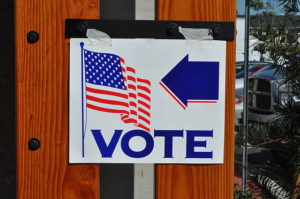Ode to the Vote However they do it, so many Americans are doing it
Smashed. Unprecedented. Historic.
As minutely detailed by the US Election Project, 2020 is shattering records for early voting. As of 9 a.m. today, 45,272,131 people have cast ballots in the US presidential election.
The Election Project—a website maintained by University of Florida political scientist Michael McDonald and distributed under a Creative Commons license—is very cool. You can search by state and, in many cases, see the number of mail-in ballots sent out per county and the number returned (updated in real time), along with the number of votes cast in person where early voting has begun.
The biggest factor in the surge of mail-in ballots is, of course, the coronavirus pandemic; folks fearful of contracting COVID-19 are opting to mail or drop their ballots in official boxes for collection. Early voting numbers also reflect just how important this election is to so many. And voters who have or say they’ll vote in person indicate the concern among Americans that while mail-in voting may be safer from a health standpoint, their vote is more secure when cast in person. Seems nothing mobilizes us more than thinking our fundamental rights are being suppressed.
What does the right to vote mean to you?
I’m struck by the many ways we talk about voting for representative government, whether it be with lofty reverie, stern judgment, or something closer to sinister fear of what’ll happen if an election doesn’t go a certain way.
“We do not say that a man who takes no interest in politics is a man who minds his own business; we say that he has no business here at all,” the Athenian statesman Pericles intoned. In a somewhat similar vein, 2012 Humanist of the Year Gloria Steinem says, “If you don’t vote, you don’t exist.”
Others eschew judgment, perhaps for fear it might result in previous nonvoters digging in their heels and sitting out another election. Instead the thrust is to inspire and empower: “Democracy is based upon the conviction that there are extraordinary possibilities in ordinary people,” goes the popular quote from early twentieth-century liberal minister Harry Emerson Fosdick (who, among other things, rejected creationism and defended the teaching of evolution in schools).
John Lewis called one’s vote “precious” indicating it was both highly valuable and in need of protection.
Perhaps no one spoke in more grandiose terms about voting than the so-called Bard of Democracy, Walt Whitman. In his poem, “Election Day, 1884,” he calls the exercise no less than the Western world’s “powerfulest scene and show.” Niagara Falls, Yosemite, Yellowstone, the Great Lakes—none of it compares in Whitman’s eyes to
This seething hemisphere’s humanity, as now, I’d name—the still small voice vibrating—America’s choosing day […]
Whitman stresses his passion is for the process, not the politician: “The heart of it not in the chosen—the act itself the main, the quadriennial choosing,”
The stretch of North and South arous’d—sea-board and inland—Texas to Maine—the Prairie States—Vermont, Virginia, California,
The final ballot-shower from East to West—the paradox and conflict…
My guess is Whitman’s not making reference to the absurd sway of the Electoral College, but rather what is, when you think about it, an indisputably awesome undertaking: an entire nation of people (well, those who actually cast votes) choosing one person for the highest office in the land.
And yes, there is conflict. There is voter suppression. As the late great Ruth Bader Ginsburg said in her dissent in 2013’s Shelby County, Ala. v. Holder, which found Section 4(b) of the Voting Rights Act of 1965 unconstitutional, keeping preclearance requirements in place for making changes to voting laws would “guard against backsliding.” And what she knew would happen has, with strict ID requirements disenfranchising people, with the number of polling places and drop boxes cut, and so on.
There is intimidation. I was sickened to read about the guy in Frederick, Maryland, who delivered handwritten letters to neighbors who had lawn signs supporting the Democratic ticket. “We have a list of homes and addresses by your election signs. We are the ones with those scary guns,” the letters read. “We are the ones your children have nightmares about.” The writer, James Dale Reed (who’s in police custody) also threatened to beat Joe Biden, rape Kamala Harris, and then kill them both.
Also, don’t let anyone tell you that you have to turn your t-shirt inside out—not unless the message is in direct support of a candidate on the ballot!
There is deception—Whitman hardly could have imagined the technical trickery we see today. How could the so-called good gray poet even process the irony that an internet domain name belonging to a designated hate group was dropped by the hosting service because a watchdog group complained, only to leave the web address floating in the cyber ether for others (potentially a foreign entity or two) to use to send intimidating messages to Americans warning them to vote for a certain candidate “or we will come after you”?
“Election Day, 1884” ends with hope for “the peaceful choice of all,”
Or good or ill humanity—welcoming the darker odds, the dross:
—Foams and ferments the wine? it serves to purify—while the heart pants, life glows:
These stormy gusts and winds waft precious ships,
Swell’d Washington’s, Jefferson’s, Lincoln’s sails.
However you’re going to do it (or already have), I hope your vote isn’t unnecessarily difficult to cast and that you stay healthy and your vote counts. While the heart pants, life glows.

